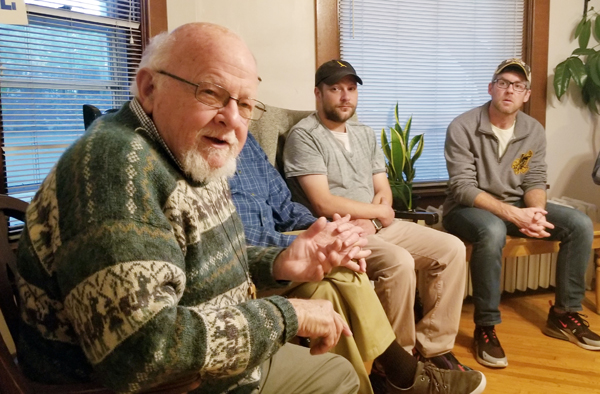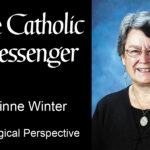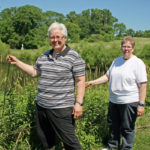
Deacon John Donaghy talks about his missionary work in Honduras with visitors and houseguests of the Catholic Worker House in Iowa City on Oct. 18
By Lindsay Steele
The Catholic Messenger
IOWA CITY — As the sun began to set, Deacon John Donaghy sat in the gathering space of the Catholic Worker House surrounded by English and Spanish speakers eager to hear about his experiences as a missionary in rural Honduras.
Deacon Donaghy — known as Juancito to the people he works with — has served the western region of the Central American country for the past 12 years at Dulce Nombre de María in the Diocese of Santa Rosa de Copán. “It’s a poor area in a poor country,” he said, noting that Honduras is the second-poorest country in the Americas, behind Haiti. The poverty rate is nearing 70 percent, he said.
Many of the people listening to the bilingual talk Oct. 18 at the Catholic Worker House were natives of Honduras. Seven of the 11 houseguests are Honduran refugees. David Goodner, co-founder of Iowa City Catholic Worker, said he learned about Deacon Donaghy’s mission work through Facebook. The deacon spoke in Iowa City as part of his annual trip to Iowa to share his experiences with his parish in Ames, which helps support his ministry.
Becoming a missionary
Before beginning his ministry in Honduras, Deacon Donaghy served in campus ministry and social ministry at St. Thomas Aquinas Church and Catholic Student Center in Ames from 1983 to 2007. He also taught occasionally at Iowa State University.
The process of becoming a missionary in Honduras didn’t happen overnight. Deacon Donaghy, who is also an associate with the Dubuque Franciscans, often traveled to Central America for mission trips but hesitated to move there permanently. While volunteering in Louisiana after Hurricane Katrina in 2006, he realized a calling to be a full-time missionary. “As we were emptying out a house, there was an emptying in me, and I gained a sense of, ‘I can do this!’” The next year, he sold his belongings and moved to Honduras.
Not just “hillbillies”
He described the western region of the Central American country as mountainous. Traditionally, most of residents there made a living growing coffee, corn, beans or sugar. They carry a sense of shame exacerbated by stereotypes. Roberto Michelleti, a Honduran politician who served as the interim de facto president after the 2009 coup, once described the people who live there as hillbillies due to their rural setting and chronic lack of education, the deacon said.
Many residents do not have more than an elementary education but still have gifts to share, he continued. He and other church workers in the region try to build a sense of dignity and self-worth in people. “We try to show them that they have a wisdom to share.”
The importance of lay formation
Deacon Donaghy said the priest shortage in Honduras might be due to a lack of men with the prerequisite education. In his parish, one priest serves 45 villages which limits his ability to celebrate Mass to just once every two months in a village. Deacon Donaghy was ordained to the diaconate in 2016 so he could baptize, witness marriages, perform funeral and burial services outside of Mass and preach the homily in the villages, things he could not do as a lay missionary.
A huge part of his service to the parish is training lay ministers to serve the communities in the absence of a priest or deacon. Most villages have “Delegates of the Word” who lead Sunday Celebrations of the Word in their communities. Additionally, about 30 people serve the parish as eucharistic ministers. “We want to be of service by helping others to serve and helping people find ways to do it,” Deacon Donaghy said.
Mass exodus
Many of the Honduran refugees living at the Catholic Worker House said they left their homeland at least in part to escape gang violence. One audience member asked Deacon Donaghy to speak about his experiences with that. The area he serves does not experience violence and gang activity as much as urban areas do, he said. A Catholic Worker guest from urban Honduras, Erick Fernando Romero, offered his thoughts on the subject in Spanish and English with Deacon Donaghy’s encouragement. Romero said that a lack of jobs and government assistance in tackling the poverty issue have led many young men to join gangs. They don’t think they have another choice in providing for their families. “It is easy money,” Romero said.
Financial constraints impact people living in the rural area, as well. A drop in coffee prices in mid-2018 devastated farmers in the region, and many are now leaving the area out of desperation, hoping to find other opportunities, Deacon Donaghy said.
Accompaniment
Pope Francis’ call for all Catholic Christians to be missionaries inspires Deacon Donaghy. He believes accompaniment is where it all starts. “It’s really what we need to think about in terms of missionary work. Accompaniment is about being with people in their sorrow and their joy so they can see God’s grace in the midst of all the evil around them. They need to know that they’re loved by God.”











